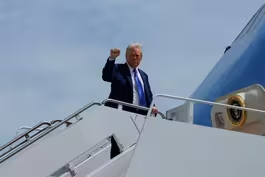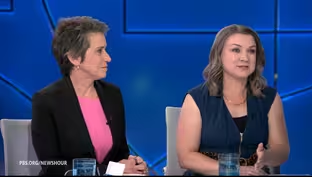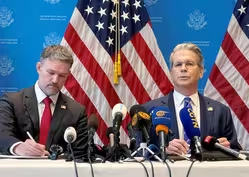
What's next for Trump's trade war after pausing tariffs
Clip: 5/12/2025 | 6m 45sVideo has Closed Captions
What's next for Trump's trade war after pausing tariffs with China
As the U.S. and China announced a surprising pause on tariffs, we're taking a look at what's behind it and where things go in the weeks ahead. To discuss the trade negotiations, Geoff Bennett spoke with Derek Scissors of the American Enterprise Institute, a conservative think tank, who closely follows the Chinese economy and U.S.-China relations.
Problems playing video? | Closed Captioning Feedback
Problems playing video? | Closed Captioning Feedback
Major corporate funding for the PBS News Hour is provided by BDO, BNSF, Consumer Cellular, American Cruise Lines, and Raymond James. Funding for the PBS NewsHour Weekend is provided by...

What's next for Trump's trade war after pausing tariffs
Clip: 5/12/2025 | 6m 45sVideo has Closed Captions
As the U.S. and China announced a surprising pause on tariffs, we're taking a look at what's behind it and where things go in the weeks ahead. To discuss the trade negotiations, Geoff Bennett spoke with Derek Scissors of the American Enterprise Institute, a conservative think tank, who closely follows the Chinese economy and U.S.-China relations.
Problems playing video? | Closed Captioning Feedback
How to Watch PBS News Hour
PBS News Hour is available to stream on pbs.org and the free PBS App, available on iPhone, Apple TV, Android TV, Android smartphones, Amazon Fire TV, Amazon Fire Tablet, Roku, Samsung Smart TV, and Vizio.
Providing Support for PBS.org
Learn Moreabout PBS online sponsorshipGEOFF BENNETT: Let's focus now on this announcement about the tariff pause, what's behind it, and where things go in the weeks ahead.
Derek Scissors closely follows the Chinese economy and U.S.-China relations.
He's a senior fellow at the American Enterprise Institute.
That's a conservative think tank.
Thanks for being back with us.
It was really striking to see the treasury secretary acknowledge that the tariffs, as he put it, resulted in an embargo on both sides that effectively ended trade between the U.S. and China.
How significant is this 90-day pause?
What's the real-world impact?
DEREK SCISSORS, American Enterprise Institute: Well, the pause is significant.
How we got here is a little strange.
But we were looking at shortages.
Secretary Bessent was right about that.
This was effective embargo on a lot of goods.
You can transship goods through other countries.
We were making some exclusions.
The Chinese were making some exclusions.
But a lot of goods were just not going to appear.
So there were going to be shortages for American firms and American consumers starting later this month.
And with the pause, you're going to get some resumption at least of trade.
And so those shortages should be quick.
And that's what President Trump wanted.
GEOFF BENNETT: How did China find its way to this short-term deal or the U.S., for that matter?
What drove both countries back to the negotiating table?
DEREK SCISSORS: Well, I think they have two different timelines.
The U.S. is very concerned about the short term.
President Trump did not want to take the political and economic hit of an actual trade conflict.
He talks about it all the time.
He says, other countries are ripping us off.
I have to do this.
But as soon as actual costs reared their head, he backed off.
The Chinese have a long-term risk.
They impose a lot of costs on their own people all the time.
They're not too worried about things getting worse in China in July and August.
But they face a deflationary environment with low growth.
And losing the U.S. as an export market for the long term,that was scary to the Chinese.
So we came to the table for short-term reasons.
They came to the table for long-term reasons.
GEOFF BENNETT: And looking big picture at the president's tariff plan or tariff policy, the administration argues that you have to look at the policy as a whole, his economic policy as a whole, tariffs paired with tax cuts and deregulation.
Taken together, might any of that result in an economic gain?
DEREK SCISSORS: It's a little strange.
If you're working a pro-growth agenda, if that's what you want, you're not as worried about other things, you're really worried about growth, tariffs are not pro-growth.
So the tariff part of it doesn't make sense.
If you're working to balance trade outcomes, then the tariffs make sense, but now your tax cut is actually going to boost the U.S. trade deficit, right?
We're going to boost demand.
We're going to increase growth in the country, which a lot of people would say is a good thing.
That's going to boost imports, including Chinese imports.
So they don't mix well together.
It's as if the administration has two different economic strategies at the same time and just jumps back and forth from one to the other whenever it's convenient.
GEOFF BENNETT: So what do the next three months hold for the prices of Chinese goods and for the global supply chain?
DEREK SCISSORS: Well, this is definitely going to at least temporarily ease supply chain problems.
I don't know if prices are really the issue.
It was more availability.
We were just not going to get Chinese goods at 145 percent tariffs.
They weren't going to be shipped.
And so that's going to happen.
It's baked in at this point, but it shouldn't last very long.
And sometime, let's say 60 days from now, we're back to normal, at least for the moment.
And people will act as if the crisis has passed.
I think that's wrong.
I don't think we're on sustainable footing.
All the things that President Trump has complained about with regard to U.S.-China trade are still in existence.
And with regard to U.S. trade with other countries, I think he's going to get some trade data for the year and into next year that he's not going to like.
So, the short term, I think we're going to have some shortages.
They're going to be resolved.
Through the 90-day period, things are going to return to some semblance of normalcy.
But people should be wary because that's not going to last for too long.
GEOFF BENNETT: And, on that point, the treasury secretary emphasized today that the deal really is just for a pause.
I mean, what are the challenges in getting beyond that to a final agreement?
DEREK SCISSORS: They're huge.
It was remarkable to me to listen to Secretary Bessent and President Trump today sound so much like President Obama and Secretary Geithner and a whole bunch of other presidents and treasury secretaries, saying, we're going to negotiate with the Chinese and they're going to restructure and we're going to make trade more balanced and they're going to make these big changes.
We have been saying that for 25 years.
And, of course, it hasn't happened, quite the opposite.
And President Trump knows that.
He's been critical of it for almost the entire time.
Yet today we hear the same thing from him and his treasury secretary that we have heard from so many presidents and treasury secretaries in the past.
The Chinese are not going to restructure their economy for the United States, certainly not for like a tariff imposition that only lasted a few weeks, and probably not at all.
If the U.S. wants to change trade with China, we're going to have to take the necessary and costly actions.
Pretending we can negotiate with the Chinese the way we have for 25 years isn't going to work, and it's just a matter of time when people recognize that as not a winning strategy.
GEOFF BENNETT: How fragile, in your view, is this 90-day pause?
DEREK SCISSORS: Well, I think we can get through the 90 days itself.
There's going to be some criticism of President Trump for, why did you escalate and then de-escalate?
You got nothing out of the de-escalation.
There was no Chinese promises at all.
Why did we go through all this?
But I think we can get through the 90 days.
I think, after the 90 days, the U.S. is going to have to roll out some set of wins from China if we want to keep the tariff slow.
And it's very hard to know what those are.
TikTok deal maybe.
The Chinese will promise to stop fentanyl.
But we have already had the administration say it's successfully stopped fentanyl.
They will promise to buy more U.S. goods.
They promised that before, and it hasn't happened.
So I think the 90 days will work out.
I think the clock really starts ticking, oddly, when the 90 days run out.
Secretary Bessent gets up in front of America and says, this is the deal we got.
And it's going to pretty quickly be obvious it's not a great deal.
It's not going to change things very much.
And then pressure on the Trump administration to take trade action will rise again.
GEOFF BENNETT: Derek Scissors, thanks so much for sharing your insights with us this evening.
We appreciate it.
DEREK SCISSORS: Thanks for having me.
Last living American hostage held in Gaza released by Hamas
Video has Closed Captions
Clip: 5/12/2025 | 9m 1s | Last living American hostage released by Hamas as Netanyahu plans for Gaza's reoccupation (9m 1s)
Qatar gifting jet to Trump raises ethical and legal concerns
Video has Closed Captions
Clip: 5/12/2025 | 5m 8s | Qatar gifting Trump $400M luxury jet raises ethical and legal concerns (5m 8s)
Tamara Keith and Amy Walter on Trump's tariff negotiations
Video has Closed Captions
Clip: 5/12/2025 | 6m 52s | Tamara Keith and Amy Walter on Trump's tariff negotiations (6m 52s)
U.S. and China roll back tariffs as they try to reach deal
Video has Closed Captions
Clip: 5/12/2025 | 4m 55s | U.S. and China roll back steep tariffs as they try to reach a larger deal (4m 55s)
What to expect after Trump demands lower drug prices
Video has Closed Captions
Clip: 5/12/2025 | 6m 33s | What to expect after Trump signs order demanding lower prices from drug companies (6m 33s)
White South Africans granted refugee status in U.S.
Video has Closed Captions
Clip: 5/12/2025 | 5m 57s | White South Africans arrive in U.S. after receiving refugee status from Trump (5m 57s)
Providing Support for PBS.org
Learn Moreabout PBS online sponsorship
- News and Public Affairs

FRONTLINE is investigative journalism that questions, explains and changes our world.

- News and Public Affairs

Amanpour and Company features conversations with leaders and decision makers.












Support for PBS provided by:
Major corporate funding for the PBS News Hour is provided by BDO, BNSF, Consumer Cellular, American Cruise Lines, and Raymond James. Funding for the PBS NewsHour Weekend is provided by...





